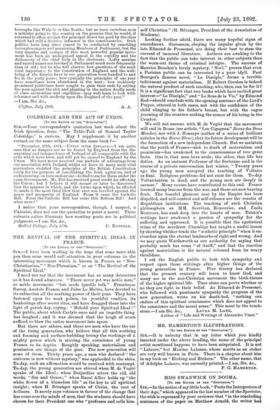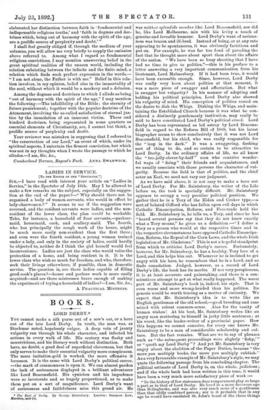MISS SWANWICK ON DOGMA.
[TO TER EDITOR OF THE " srzczAzoa."1
SIE,—In the notice of my little book, " Poets the Interpreters of their Age," which appeared in the last number of the Spectator, the wish is expressed by your reviewer that "in the concluding sentences of the paper on Matthew Arnold, the writer had elaborated her distinction between faith in fundamental and indispensable religions truths,' and faith in dogmas and doc- trines which, being out of harmony with the spirit of the age, are a prolific source of perplexity and doubt."
I shall feel greatly obliged if, through the medium of your columns, you will allow me very briefly to supply the omission above referred to. Among what I regard as fundamental religious convictions, I may mention unswerving belief in the great spiritual realities of the unseen world, including the relation subsisting between the infinite and the finite mind, a relation which finds such perfect expression in the words,- " I am not alone, the Father is with me." Belief in this rela- tion involves, in my opinion, belief also in the immortality of the soul, without which it would be a mockery and a delusion.
Among the dogmas and doctrines to which I allude as being " out of harmony with the spirit of the age," I may mention the following :—The infallibility of the Bible; the eternity of future punishment; together with the popular doctrine of the Atonement, involving the so-called satisfaction of eternal jus- tice by the immolation of an innocent victim. These and kindred doctrines, being represented in some quarters as essential elements of Christianity, are, I cannot but think, a prolific source of perplexity and doubt.
Your reviewer was mistaken in supposing that I referred to " the resurrection of our Lord," an event of which, under its spiritual aspects, I entertain the firmest conviction, but which was not in my thoughts when I wrote the passage to which he alludes.—I am, Sir, &c.,
Cumberland Terrace, Regent's Park. ANNA SWANWICK.



































 Previous page
Previous page